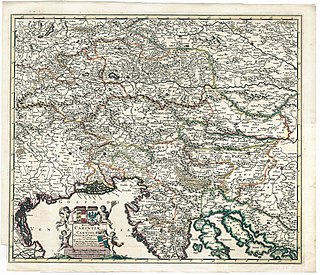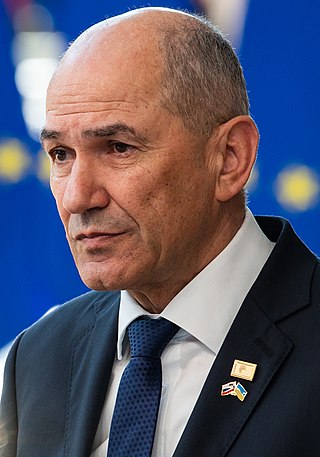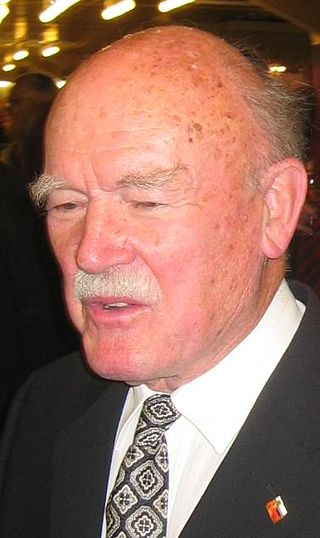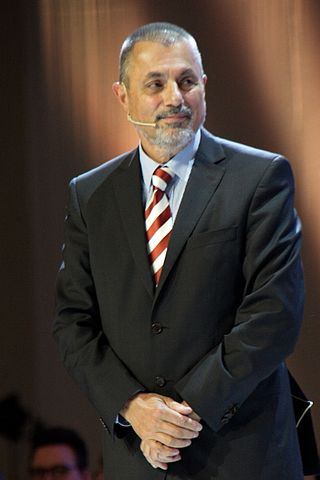Related Research Articles

The history of Slovenia chronicles the period of the Slovenian territory from the 5th century BC to the present. In the Early Bronze Age, Proto-Illyrian tribes settled an area stretching from present-day Albania to the city of Trieste. The Slovenian territory was part of the Roman Empire, and it was devastated by the Migration Period's incursions during late Antiquity and the Early Middle Ages. The main route from the Pannonian plain to Italy ran through present-day Slovenia. Alpine Slavs, ancestors of modern-day Slovenians, settled the area in the late 6th Century AD. The Holy Roman Empire controlled the land for nearly 1,000 years, and between the mid-14th century and 1918 most of Slovenia was under Habsburg rule. In 1918, most Slovene territory became part of the Kingdom of Serbs, Croats, and Slovenes, and in 1929 the Drava Banovina was created within the Kingdom of Yugoslavia with its capital in Ljubljana, corresponding to Slovenian-majority territories within the state. The Socialist Republic of Slovenia was created in 1945 as part of federal Yugoslavia. Slovenia gained its independence from Yugoslavia in June 1991, and today it is a member of the European Union and NATO.
The politics of Slovenia takes place in a framework of a parliamentary representative democratic republic, whereby the Prime Minister of Slovenia is the head of government, and of a multi-party system. Executive power is exercised by the Government of Slovenia. Legislative power is vested in the National Assembly and in minor part in the National Council. The judiciary of Slovenia is independent of the executive and the legislature. Slovenia is a Member State of the European Union and is represented in the Council of the EU and through elections to the European Parliament.

Fidesz – Hungarian Civic Alliance is a right-wing populist and national-conservative political party in Hungary led by Viktor Orbán.
Liberal Democracy of Slovenia is a social-liberal political party in Slovenia. Between 1992 and 2004, it was the largest party in the country. In the 2011 Slovenian parliamentary election, it failed to win entry to the Slovenian National Assembly. The party was a member of the Liberal International and the Alliance of Liberals and Democrats for Europe.

The Slovenian Democratic Party, formerly the Social Democratic Party of Slovenia, is a conservative parliamentary party; it is also one of the largest parties in Slovenia, with approximately 30,000 reported members in 2013.

The Union of Democratic Forces is a political party in Bulgaria, founded in 1989 as a union of several political organizations in opposition to the communist government. The Union was transformed into a single unified party with the same name. The SDS is a member of the European People's Party (EPP). In the 1990s the party had the largest membership in the country, with one million members, but has since splintered into a number of small parties totaling no more than 40,000 members. The SDS proper had 12,000 members in 2016.

Ivan Janša, baptized and best known as Janez Janša, is a Slovenian politician who served three times as a prime minister of Slovenia, a position he had held from 2004 to 2008, from 2012 to 2013, and from 2020 to 2022. Since 1993, Janša has led the Slovenian Democratic Party, which has emerged as the pre-eminent Slovenian conservative party. Janša lost his fourth bid for prime minister in April 2022, his party defeated by the Freedom Movement party.
National conservatism is a nationalist variant of conservatism that concentrates on upholding national, cultural identity, communitarianism, and the public role of religion. It shares aspects of traditionalist conservatism and social conservatism, while departing from economic liberalism and libertarianism, as well as taking a more agnostic approach to regulatory economics and protectionism. National conservatives usually combine conservatism with nationalist stances, emphasizing cultural conservatism, family values and opposition to illegal immigration or opposition to immigration per se. National conservative parties often have roots in environments with a rural, traditionalist or peripheral basis, contrasting with the more urban support base of liberal conservative parties.
Mladina is a Slovenian weekly left-wing political and current affairs magazine. Since the 1920s, when it was first published, it has become a voice of protest against those in power. Today, Mladina's weekly issues are distributed throughout the country. Mladina is considered one of the most influential political magazines in Slovenia.
The mass media in Slovenia refers to mass media outlets based in Slovenia. Television, magazines, and newspapers are all operated by both state-owned and for-profit corporations which depend on advertising, subscription, and other sales-related revenues. The Constitution of Slovenia guarantees freedom of speech and Slovenia ranked 40th in the 2016 Press Freedom Index report compiled by Reporters Without Borders, falling by 5 places if compared to the 2015 Index.

Milan Zver is a Slovenian politician and Member of the European Parliament (MEP) from Slovenia. He is a member of the Slovenian Democratic Party, part of the European People's Party. He is the Vice-President of the Slovenian Democratic Party. He served as Minister of Education and Sports from 2004 to 2008.

France Bučar was a Slovenian politician, legal expert and author. Between 1990 and 1992, he served as the first speaker of the freely elected Slovenian Parliament. He was the one to formally declare the independence of Slovenia on 25 June 1991. He is considered one of the founding fathers of Slovenian democracy and independence. He is also considered, together with Peter Jambrek, the main author of the current Slovenian constitution.

Peter Jambrek is a Slovenian sociologist, jurist, politician and intellectual. He is considered among the fathers of the current Slovenian Constitution, and the most influential public intellectuals in Slovenia.
Civic List is an inactive classical-liberal extra-parliamentary political party in Slovenia, led by Gregor Virant. LGV won 8.37% of the vote at the early 2011 Slovenian parliamentary election on 4 December 2011, thus gaining 8 seats in the National Assembly. After a quit of its deputy group by one of its deputies in April 2012, it has had 7 seats. Until April 2012 the party was named Gregor Virant's Civic List.
In the run up to the 2018 Slovenian parliamentary election, various organisations carry out opinion polling to gauge voting intention in Slovenia. Results of such polls are displayed in this article.

Parliamentary elections were held in Slovenia on 3 June 2018. The elections were originally expected to be held later in June 2018, but after the resignation of Prime Minister Miro Cerar on 14 March 2018 all parties called for snap elections. They were the third consecutive snap elections after 2011 and 2014.
Nova24TV is a Slovenian right-wing news media conglomerate operating an eponymous news television channel and online news portal. Nova24TV was founded by members and supporters of the Slovenian Democratic Party. The news media organisation's stated mission is to provide an alternative perspective that reflects the values of the European right.

Anže Logar is a Slovenian politician who was Minister of Foreign Affairs in the third Janša cabinet from March 2020 to June 2022.
Events from 2021 in the European Union.
The Hungarian conservative party Fidesz has been accused of exhibiting anti-democratic and authoritarian tendencies since their return to leading the Hungarian government in 2010 under the leadership of Viktor Orbán in his second premiership. The Fidesz-led government has been accused of severely restricting media freedom, undermining the independence of the courts, subjugating and politicising independent and non-governmental institutions, surveilling political opponents, engaging in electoral engineering, and assailing critical NGOs. The Fidesz-led government has been accused of engaging in cronyism and corruption. Fidesz has been accused of antisemitism, and the Fidesz-led government has been accused of passing legislation that violates the rights of LGBT persons. Due to its controversial actions, Fidesz and its government have come in conflict with the EU on multiple occasions.
References
- 1 2 Everete E. Dennis; Jon Vanden Heuvel (October 1990). "Emerging Voices: East European Media in Transition. A Gannett Foundation Report" (Report). Ganet Foundation. p. 76. Retrieved 28 November 2014.
- ↑ Peter Lah; Suzana Žilič Fišer (2012). "Journalism in Slovenia". In David H. Weaver; Lars Willnat (eds.). The Global Journalist in the 21st Century. New York; London: Routledge. p. 284. ISBN 978-0-415-88576-8.
- 1 2 "Slovenia". World Press. Retrieved 26 November 2014.
- 1 2 "Demokracija". Cnet. Retrieved 26 November 2014.[ permanent dead link ]
- ↑ Tamara Kotar (2009). "Slovenia". In Lavinia Stan (ed.). Transitional Justice in Eastern Europe and the Former Soviet Union: Reckoning with the Communist Past. London: Routledge. p. 220. ISBN 978-1-135-97099-4.
- ↑ Andreja Vezovnik (15 November 2010). "Krekism and the Construction of Slovenian National Identity: Newspaper Commentaries on Slovenia's European Union Integration". In Ljiljana Saric; et al. (eds.). Contesting Europe's Eastern Rim.Cultural Identities in Public Discourse. Bristol; Buffalo, NY; Toronto: Multilingual Matters. p. 125. ISBN 978-1-84769-486-7.
- 1 2 Saška Cvetkovska Delić (28 February 2020). "Oiling Orbán's Propaganda Machine". OCCRP. Archived from the original on 29 February 2020. Retrieved 19 October 2020.
- ↑ "Strankarsko glasilo SDS v roke madžarskega tabloida" (in Slovenian). Retrieved 27 July 2017.
- ↑ "Rusija blokirala več evropskih medijev, tudi slovenska Nova24TV in Demokracija". Siol. Retrieved 25 June 2024.